I Tried to Buy a Face Mask in New York City Amid Coronavirus Fears. It Was Almost Impossible.
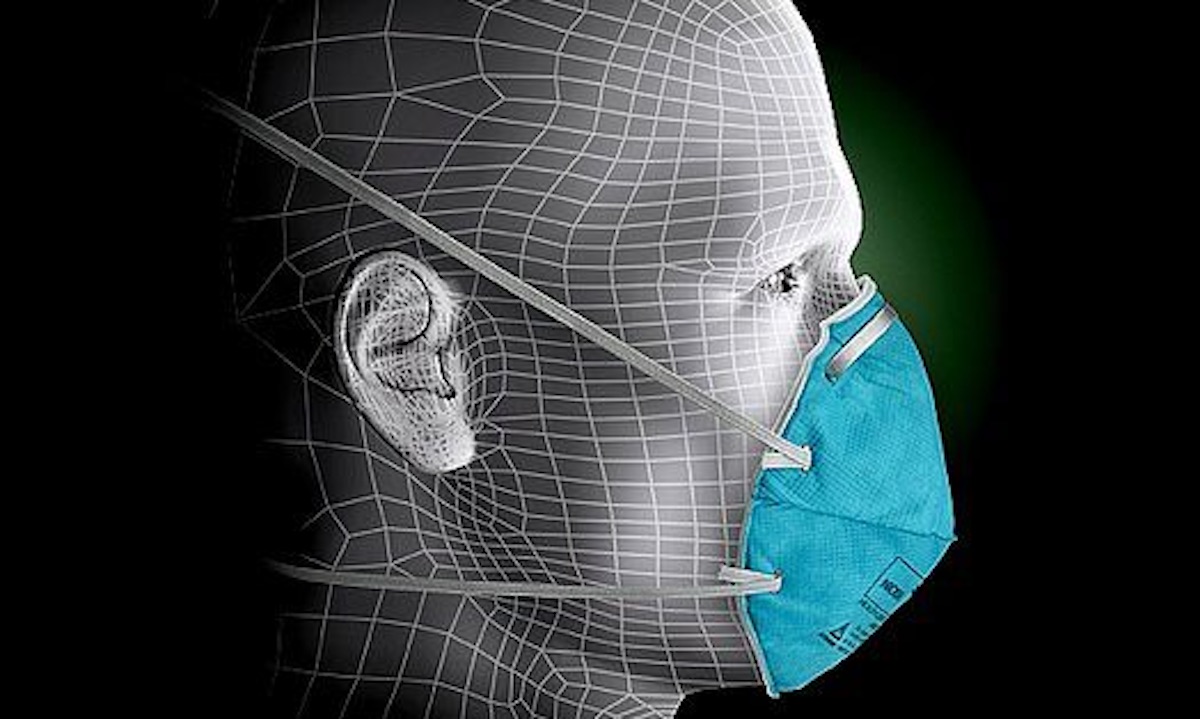

3M
With worries over the coronavirus and a potential outbreak in America on the rise, I decided to see how hard it would be to get my hands on a face mask in the city where you can buy anything. Except, apparently, face masks.
After health officials on February 25th warned Americans to prepare for the spread of the coronavirus, many Americans tried to do just that in the way they thought prudent: attaining a stockpile of face masks. Demand worldwide for supplies to prevent and combat the coronavirus is “unprecedented,” and there appears to have been a rather massive run on masks.
This includes both the surgical variety, which are of dubious effectiveness in public, and “respirators,” which are more commonly used to filter particles in the air like dust, wood, and aerosols, and are employed on a regular basis by construction workers and artists.
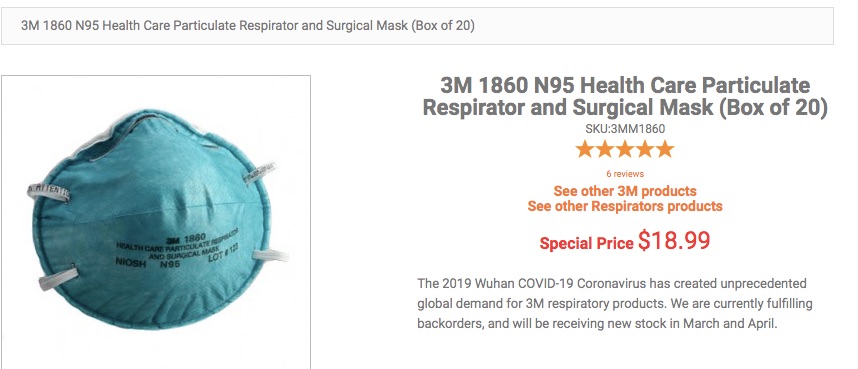
EnviroSafety
The CDC recommends the use of an N95 particulate respirator mask as the most effective protection against the coronavirus, or COVID-19. They do not, however, currently recommend the regular use of respirator masks, which can make breathing difficult, in everyday situations. They’ve gone so far as to recommend that Americans not wear masks in regards to the coronavirus, as incorrect mask use can cause additional health complications and also create “a negative supply shock effect on hospital personnel who need these masks more than the general public.”
At the moment, masks pretty much create a false sense of safety. As I discovered, this hasn’t stopped people from snapping them up as quickly as possible.
In a normal environment, cheap, disposable respirator masks are readily available, and run a couple of dollars apiece. In New York City, every hardware store and art supply store carries them. Until yesterday.
I was hardly the only New Yorker to decide to seek out a face mask after the CDC’s briefing, and in a city of more than 8 million people, that means any existing supplies ran out—fast. But my first stop, as it is for many of us these days, was to try the Internet. Much as we hate the Amazon monolith, Amazon is known for carrying pretty much everything, so I checked there initially.
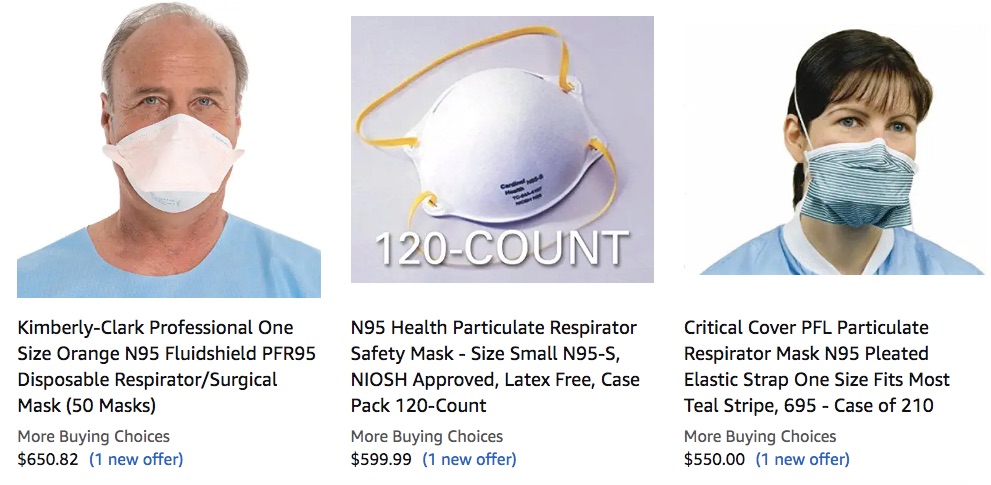
Amazon
Not only are all name-brand and CDC-compliant face masks long since sold out, the price gouging is bonkers. Boxes of masks and respirators that would have once gone for $10-$30 are now running upwards of $100-$600 and beyond from independent sellers on Amazon. (My favorite was the box of respirators that said it was $29.99, until you clicked through to discover a $300 shipping cost.)
Many more mask offerings still in stock are riddled with low-star reviews that the product was not as advertised, or warnings from buyers that these sort of masks are not effective against the spread of illness, even if they are advertised as such.
The situation is similar on eBay, where masks were “trending” all day yesterday to inflated pricing. I suppose I should amend my frustration that it was difficult to buy masks online from our giant clearinghouses with the caveat that you could buy all the masks you liked if you had significant financial resources. America!
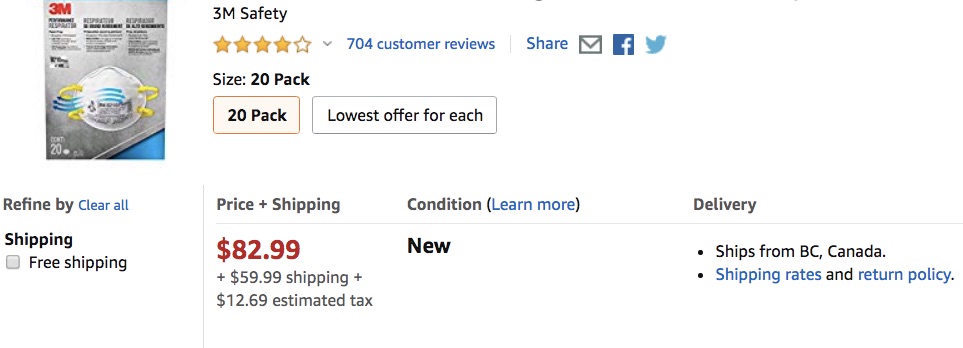
Amazon
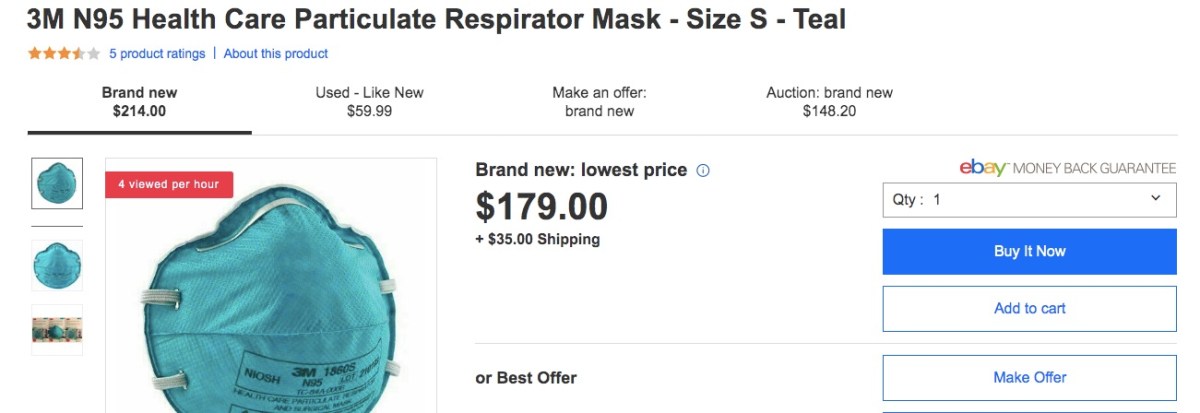
eBay
I’m skilled at finding things on the Internet, but the mask situation was like nothing I’ve encountered before. All of our big hardware suppliers—Ace, Home Depot, Lowe’s—and other resources like Bed, Bath and Beyond, Sam’s Club, Overstock, and Staples, which usually stock particulate masks, were sold out online.
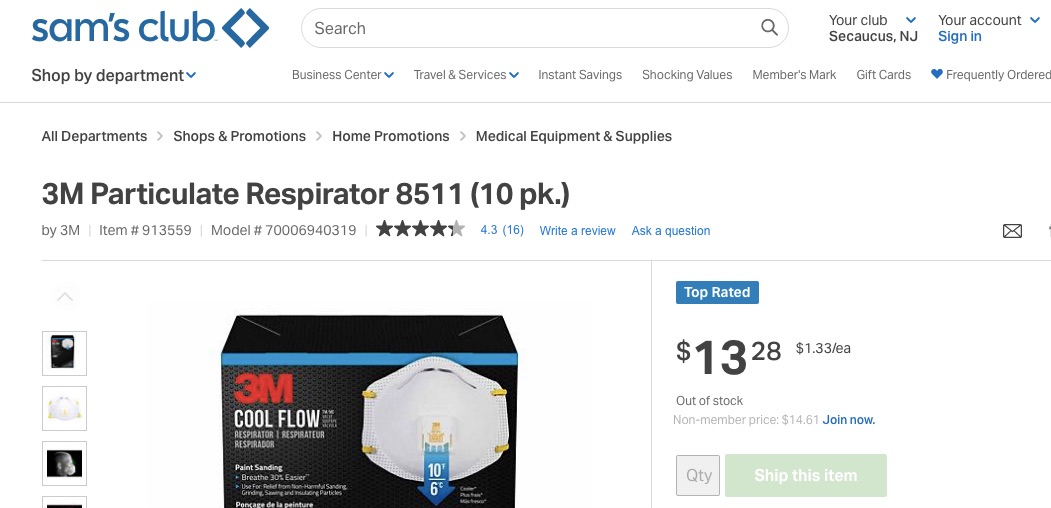
Sam’s Club
Where you had the ability to search the stock at their nearby brick-and-mortar stores, every store within any reachable radius to me, including in New Jersey and Long Island, said they were out, mask-wise.
Every other supply site where I was directed by trusted manufacturers like 3M, which makes some of the most-stocked and name-recognized particulate masks, were running on empty.
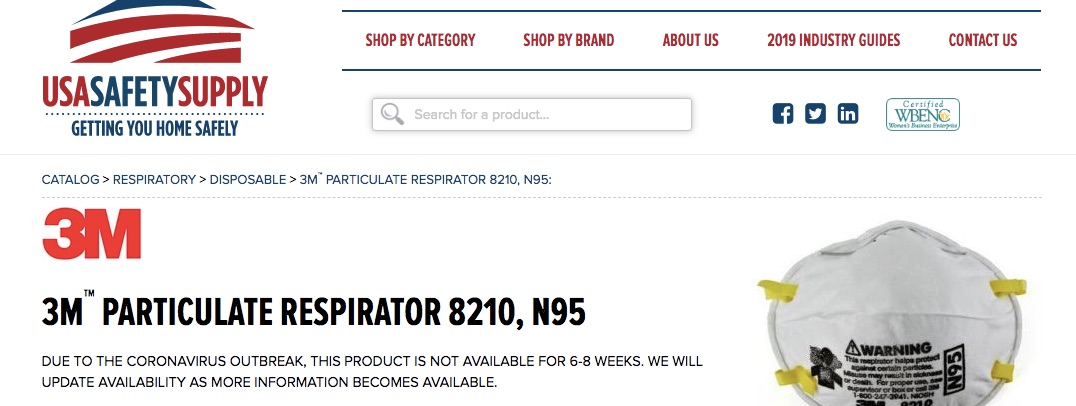
USA SafetySupply
While drug store chains like CVS, Walgreens, and Rite Aid sometimes stock surgical masks, every place I visited on my lunch break in midtown Manhattan or called was out. As a reminder, wearing a surgical mask around all day in an attempt to limit your exposure is unlikely to be effective in this case, which is why when it comes to the coronavirus, the CDC recommends the N95 particulate mask, if one simply must be masked.
Doctors warn that the benefits of wearing a surgical mask are “very, very meager,” and that they “are just a physical barrier that will protect you against ‘a visible splash or spray of fluid or large droplets,’ while small airborne particles can still get through. There’s evidence that cloth masks can even be harmful, as “infrequent washing and moisture retention” can turn them into pathogen breeding grounds.
Further, while respirator masks are more effective protection, they can also cause breathing difficulties in some people and must be worn to exact specifications in order to create a tight seal. Models vary, and wearing a mask incorrectly can render it ineffective. (The CDC has a vast wealth of information on preventative measures that people and employers can take in response to the cornonavirus, and all the mask information you can shake an empty box of masks at.)
Still, in a scramble to feel like you’re at least doing something to prepare, I understand that it can feel comforting to get your hands on a mask. So my search to uncover at least one in the city continued.
The chain Blick Art Materials showed that it was out of particulate masks at its 10 locations—all save one by Union Square, so I swung by there after work. I was told that the masks had all been sold that day, and those remaining were reserved for a customer. Next I stopped by NYC’s famed C.W. Bigelow Apothecaries, whose century-old slogan reads, “If you can’t get it anywhere else, try Bigelow!” I tried, but the very nice pharmacist there told me all masks were sold out. When I asked whether they’d be getting a new supply soon, she told me that it might be up to two months’ wait.
After my considerable dashing about, I finally discovered an N95 mask much closer to home. At my local hardware store in Bed Stuy, Brooklyn, there remained a box of Moldex N95 masks, which are CDC NIOSH (The National Institute for Occupational Safety and Health)-approved. I bought a couple, not wanting to seem like a wild-eyed person who had run around the city all day in search of face masks.
I understand that with this purchase I’m participating in the mounting fear and paranoia about the coronavirus, though the masks are intended for my mother, who is in a much more susceptible demographic and travels frequently. The great majority of coronavirus cases manifest as a respiratory illness like the flu, and the best preventative measures most of us can take involve washing hands frequently and staying in while sick. But I’m also responding directly to the CDC’s briefing, wherein officials did not mince words. Per NPR:
“It’s not so much a question of if this will happen anymore, but more really a question of when it will happen — and how many people in this country will have severe illness,” Dr. Nancy Messonnier of the Centers for Disease Control and Prevention told reporters during a briefing.
“We are asking the American public to work with us to prepare with the expectation that this could be bad,” Messonnier said.
Those measures could include school closings, workplace shutdowns and canceling large gatherings and public events, she warned.
With warnings like these, how should we best react? The sheer difficulty of attaining a basic respirator mask without spending inordinate sums of money, and the across-the-board sold-out status from our biggest retailers online, is troubling. It begs the question of just how prepared regular citizens can be if we’re already limited in a simple preventative step, even if the efficacy of mask-wearing is complicated. It’s easy to tell people masks aren’t necessary, but we’re all human, and people are afraid. While I have dozens of hardware stores and potential suppliers in this city to visit on the off-chance that they have particulate masks, what about the places in America where there’s a single store or no store at all?
While more remote locales are also less likely to be affected by a potential outbreak than a city where we’re packed into subway cars every day like sardines, it’s unfortunate that you can’t get your hands on a mask unless you’re willing or able to shell out money for hugely inflated prices. It’s even more unfortunate that price gouging is happening. And it’s unclear how long even price-gouged mask supplies will be around. Several of the listings I saw offering masks at ridiculous rates are gone today, because people bought them.
But it remains more upsetting to consider that the panicked run on mask supplies may hit those who need them most—medical practitioners and health workers, and the most vulnerable demographics of people. In our attempts to prepare, we’re likely making the situation worse. The Washington Post just put out a commonsense guide for how best to approach coronavirus preparedness—and up first is “don’t panic.” (And in the headline: “Spoiler: Not sick? No need to wear a mask.”)
My mask quest through the city and the Internet was a teaching moment. The more I learned about the CDC’s actual recommendations and guidelines, the less useful a mask seemed for a general member of the public. If there were better messaging and education around the coronavirus rather than fear-mongering from media, social media, and various Trumps, perhaps someone wouldn’t be sitting on a $190 10-pack of 3M N95 masks this very moment.
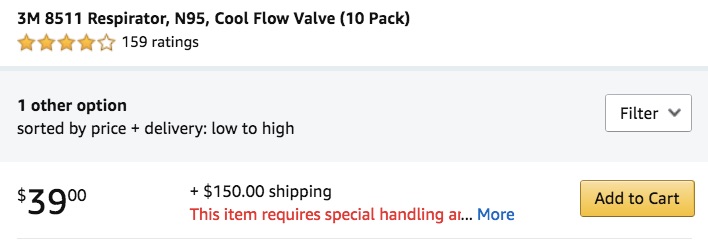
Amazon
(Coronavirus Disease —2019 at The Centers for Disease Control and Prevention)
Want more stories like this? Become a subscriber and support the site!
—The Mary Sue has a strict comment policy that forbids, but is not limited to, personal insults toward anyone, hate speech, and trolling.—
Have a tip we should know? [email protected]
